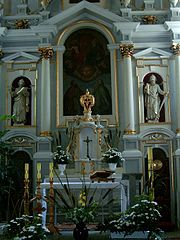
A History Of The Mass And Its Ceremonies In The Eastern And Western Church -Rev John O'Brien A.M.
CHAPTER VI
INCENSE
OF the use of Incense in divine service so much is said in the Old Testament that it is not necessary to say much about it here. Suffice it to say that its use in the Latin Church is principally confined to Solemn High Mass and Vespers, to expositions of the Blessed Sacrament, and to the obsequies of the dead. In the Eastern Church, especially with the Maronites, it is used on almost every occasion, whether the Mass be High or Low, as we shall see further on.
Its spiritual meaning is as follows: First, by its burning we are reminded how our hearts should burn with the fire of divine charity. Secondly, it represents the good odor of Christ our Lord, in accordance with that saying in the Canticle of Canticles, “We run in the odor of thy ointments.” Therefore, as Incense spreads its odor through the entire church and refreshes our bodies by its agreeable scent, so also does our Lord spread his graces to refresh and nourish our souls. Thirdly, Incense has, both in the Old and New Law, been ever looked upon as symbolic of the virtue of prayer, agreeably to that saying of the royal Psalmist, “Let my prayer, O Lord, be directed as incense in thy sight” (Ps. 140); and that of St. John in the Apocalypse, chap. 8: “Another angel came, and stood before the altar, having a golden censer; and there was given him much incense, that he should offer of the prayers of all the saints” (Bouvry, ii. 21; Bona, Rer. Liturg., 295; Durandus, Rationale Divinorum, 165).
When Incense is offered to a person it is always indicative of the highest respect. Thus, the Magi offered it to our Lord at his birth on Christmas morning. Our bodies, too, when placed in the grave, are incensed, for the principal reason that on account of the participation of the sacraments during life they became the temples of the Holy Ghost (Bouvry, ii. 594).
Copyright ©1999-2023 Wildfire Fellowship, Inc all rights reserved

 Keep Site Running
Keep Site Running